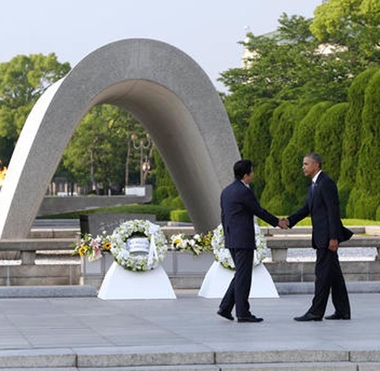Obama at Hiroshima: 'Death fell from the sky'

Hiroshima, Japan (AP) — Barack Obama on Friday paid tribute to the "silent cry" of the 140,000 people killed by the world's first atomic bomb attack and sought to renew attention in his unfulfilled vision of a world without nuclear weapons, as he became the first sitting U.S. president to visit Hiroshima.
"Death fell from the sky and the world was changed," Obama said, after laying a wreath, closing his eyes and briefly bowing his head before an arched monument in Hiroshima's Peace Memorial Park that honors those killed on Aug. 6, 1945, when U.S. forces dropped the bomb that ushered in the nuclear age. The bombing, Obama said, "demonstrated that mankind possessed the means to destroy itself."
Obama did not apologize, instead offering, in a carefully choreographed display, a reflection on the horrors of war and his hope that Hiroshima would be remembered as the beginning of a "moral awakening." As he and Japanese Prime Minister Shinzo Abe stood near an iconic bombed-out domed building, Obama acknowledged the devastating toll of war and urged the world to do better.
"We stand here in the middle of this city and force ourselves to imagine the moment the bomb fell ... we listen to a silent cry," Obama said.
A second atomic bomb, dropped on Nagasaki three days after Hiroshima, killed 70,000 more.
Obama also sought to look forward to the day when there was less danger of nuclear war. He received a Nobel Peace Prize early on in his presidency for his anti-nuclear agenda but has since seen uneven progress.
"We must have the courage to escape the logic of fear and pursue a world without them," Obama said of nuclear weapons.
Following the remarks, Abe called Obama's visit courageous and long-awaited. He said it would help the suffering of survivors and echoed the anti-nuclear sentiments.
"At any place in world, this tragedy must not be repeated again," Abe said.
The visit presented a diplomatic tightrope for a U.S. president trying to make history without ripping open old wounds.
Critics believe Obama's mere presence in Hiroshima will be viewed as an apology for what they see as a justified attack. But he has also drawn praise from those who see it as a long overdue gesture for two allies ready to bury a troubled past.
Obama's remarks showed a careful awareness of the sensitivities. He included both South Koreans and American prisoners of war in recounting the death toll at Hiroshima — a nod to advocates for both groups that publicly warned the president not to forget their dead.
Obama spoke broadly of the brutality of the war that begat the bombing, but did not assign blame.
After his remarks, he met with two survivors, but his remarks to the aging men were out of ear shot of reporters.
At one point, Obama could be seen laughing and smiling with 91-year-old Sunao Tsuboi, and he embraced Shigeaki Mori, 79, in a hug. But mostly, Obama just listened the men as they spoke through an interpreter.
The visit was meant to demonstrate the strength of the U.S.-Japanese alliance, and Obama and Abe took each step together. The men walked along a tree-lined path, past an eternal flame, toward a river that flows by the domed building that many associate with Hiroshima.
They went to the lobby of the peace museum to sign the guest book: "?We have known the agony of war. Let us now find the courage, together, to spread peace, and pursue a world without nuclear weapons," Obama wrote, according to the White House.
The president's call for a nuclear-free world was a far cry from the optimistic rallying cry he delivered as young, newly elected president. Obama did not employ his campaign slogan — "Yes, we can" — as he did in a speech in Prague in 2009. Instead, the president hoped for the "courage to escape the logic of fear" and spoke of diligent, incremental steps.
"We may not realize this goal in my lifetime but persistent effort can roll back the possibility of catastrophe," he said. "We can chart a course that leads to the destruction of these stockpiles."
Obama touched down in Hiroshima after completing talks with world leaders at an international summit in Shima, Japan.
Those who come to ground zero at Hiroshima speak of its emotional impact, of the searing imagery of the exposed steel beams on the iconic A-bomb dome. The skeletal remains of the exhibition hall have become an international symbol of peace and a place for prayer.
Bomb survivor Kinuyo Ikegami, 82, paid her own respects at the cenotaph on Friday morning, well before Obama arrived, lighting incense and chanting a prayer.
Tears ran down her face as she described the immediate aftermath of the bomb.
"I could hear schoolchildren screaming: 'Help me! Help me!'" she said. "It was too pitiful, too horrible. Even now it fills me with emotion."
Han Jeong-soon, the 58-year-old daughter of a Korean survivor, was also at the park Friday.
"The suffering, such as illness, gets carried on over the generations — that is what I want President Obama to know," she said. "I want him to understand our sufferings."
Obama's visit is a moment 71 years in the making. Other American presidents considered coming, but the politics were still too sensitive, the emotions too raw. Jimmy Carter visited as a former president in 1984.
By Nancy Benac and Foster Klug, Associated Press. Copyright 2016 The Associated Press. All rights reserved. This material may not be published, broadcast, rewritten or redistributed.
The Gayly – May 27, 2016 @ 7:30 a.m.





